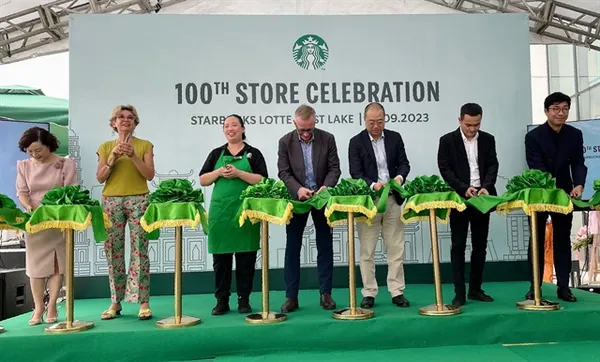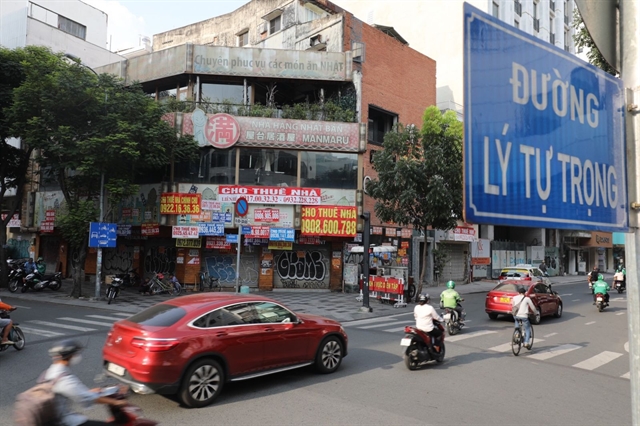 Economy
Economy

 |
| Many premises along busy streets in Hà Nội and HCM City remain empty or closed. — Photo diendandoanhnghiep.vn |
Compiled by Mai Linh
HÀ NỘI — At the end of August, many were surprised to hear that Starbucks closed its first and only premium Starbucks Reserve store in HCM City on Hàn Thuyên, District 1 after seven years of operation despite the shop being a popular destination due to its prime location and beautiful views.
Starbucks Vietnam did not mention any specific reason for the closure, but rumours suggest the rent has become too high, at VNĐ750 million per month, nearly double the rate from seven years ago for a three-floor building of 210sq.m each opposite 30/4 Park and close to Notre-Dame Cathedral Basilica of Sài Gòn.
Starbucks Reserve Hàn Thuyên would need to sell 200-300 cups per day to cover the rent only, not taking into account other costs.
This is a problem not only affecting Starbucks. Many brands have also recently closed their stores at prime locations.
Organic food brand Danny Green recently rented a building on Lý Tự Trọng Street at Phù Đổng Roundable in District 1, HCM City at the rent of no less than VNĐ700 million per month to sell organic fruits and vegetables. Four brands rented the building then quit within five years.
Phúc Long closed their store there in 2019 after five years because the rent was raised from $14,000 to $25,000. Soya Garden and PhinDeli rented the building at around $25,000 then closed their stores in just around one year. Suitcases and bags brand Mia rented the building at $26,000 per month from November 2022 to March 2024.
Highlands Coffee also closed a shop at the corner of Nguyễn Du and Pasteur streets. YEN Shushi closed a restaurant on Đồng Khởi.
There are dozens of prime locations in major cities which are convenient for brand recognition, but the rents are often quite high. These super-high-end premises are only for businesses with their own strategies such as brand recognition, while for businesses that only want to make profits from selling products and services, it will be very difficult to survive.
High rents in a struggling economy forcing businesses to close offline stores is not a new thing but has been happening since the COVID-19 pandemic. Many premises along busy streets in Hà Nội and HCM City remain empty or closed.
Price gouging?
According to data of real estate trading platform Batdongsan.com, the rents of townhouses in HCM City continue to increase in the first six months of this year, up by 25-40 per cent over the same period last year.
Đinh Minh Tuấn, director of Batdongsan.com, said that owners of the high-end premises often have good cash flow. They are not really concerned whether they can rent out the house or not but how to rent out at high prices to maintain and increase the value of the properties.
Tuấn said a house rented at VNĐ100 million per month can be sold for VNĐ120 billion but if the rent is VNĐ150 million per month, the property can be valued at VNĐ150 billion. The future cash flows significantly affected the valuation of the townhouses, he said.
Đỗ Thị Xuân Trang from commercial real estate agent Avison Young said that some retail premises for lease in the central area in the southern city have shown positive signs, but the recovery rate is uneven due to large differences in location and demand.
Retail brands are being more cautious in choosing physical locations instead of massive expansion. It is predicted that the retail townhouse market will gradually recover in 2024 but will only reach about 80 per cent of the pre-pandemic level, she said.
It is also important that landlords bring rental prices to their true value instead of competing to increase them, causing difficulties to businesses.
Moving online
Apart from exorbitant rents, there are other reasons for businesses closing offline stores.
Maybe they no longer have demand or have found the business situation is not feasible in the future, Nguyễn Hồng Hải, chairman of VNO Investment and Development Joint Stock Company said.
In the food and beverage (F&B) industry, a report by iPOS.vn showed that there were about 304,700 offline stores in Việt Nam as of the end of June, dropping by 3.9 per cent against 2023, meaning that around 30,000 stores were closed in the period.
Lê Thị Tú Uyên, who sells environmentally friendly products, rented a physical store for VNĐ20 million per month in District 1 but closed the store after three months to sell online because she was unable to cover the costs. Online orders are quite good, she said, adding that she expected the development of online sales will be a factor to lower rents to the true value.
Coffee chain The Coffee House recently closed shops in Cần Thơ, and some in Đà Nẵng, Hà Nội, HCM City, Hải Phòng, Bà Rịa – Vũng Tàu, Kiên Giang, Nghệ An and Bắc Ninh. At the same time, The Coffee House develops a mobile app for customers to order online.
The online food delivery market was estimated at VNĐ52.4 trillion in 2023, 3.5 times higher than the pre-pandemic period.
A survey found that among F&B businesses with online apps, 47.9 per cent have online revenue accounting for 25-50 per cent of their total revenue.
However, Hoàng Tùng, president of F&B Investment and FoodEdu Academy said the contribution to F&B revenue remains modest in comparison to offline shops. Thus, business premises still play an important role in the F&B industry, he added.
Nguyễn Hồng Linh, a market director of Japanese food chain JCR Việt Nam, said that although Việt Nam F&B market has significant potential, caution is needed rather than massive expansion because of high competition.
iPOS.vn also found that F&B companies are more cautious with expanding operation in the remaining months of this year. More than 61.2 per cent said that they would try to maintain their current operation scale while only 34.4 per cent planned to open new facilities.
The findings also showed that the percentage of consumers ready to spend more than VNĐ100,000 per cup dropped significantly from 6 per cent to 1.7 per cent in the first six months of this year, an alarming sign for high-end brands.
Meanwhile the F&B industry saw the rapid expansion of lower-end brands which are not affected much by customers’ belt-tightening with streamlined operation models focusing on takeaways.
For example, Chinese bubble tea and ice cream franchise Mixue had 1,500 stores at the end of 2023, just five years after its launch in Việt Nam. The chain reported a 2.6-time increase in revenue to reach more than VNĐ1.25 trillion and pre-tax profits of VNĐ204 billion last year.
A report by Kirin Capital forecasts that the F&B market in Việt Nam will increase by 10.92 per cent to reach more than VNĐ655 trillion this year. — VNS